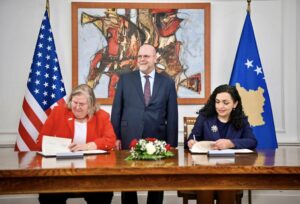The temporary suspension of US foreign aid has brought the “post-development aid” era closer than expected, and local organizations must start reshaping a future that leverages the expertise nurtured by foreign aid over the years to build more substantial local leadership.
The recent Executive Order from President Donald Trump suspending US foreign aid has taken many across the Western Balkans, particularly in Kosovo, by surprise. While a recent US court ruling has temporarily blocked President Trump’s executive order shutting down the United States Agency for International Development, USAID, the uncertainty surrounding future funding remains.
Civil society organizations, CSOs, many of which have long relied on foreign development aid—not only from the U.S. but also from European donors—face an uncomfortable but immediate reality check: how to sustain their work without this lifeline.
The six Western Balkan countries collectively receive an estimated US $400 million (around 380 million euros) annually in projects funded by USAID and other US-affiliated organizations, with Kosovo and Bosnia and Herzegovina being the primary beneficiaries. From 2020 until the end of 2024, the United States invested US $1.7 billion (around 1.62 billion euros) in aid in the Western Balkans Six, supporting civil society organisations, state institutions, and projects in areas ranging from human rights and media to energy efficiency.
Through USAID alone Kosovo, Bosnia-Herzegovina, and Serbia rank among the top ten recipients worldwide, with over US $300 million in active projects combined.
The impact of foreign aid withdrawal will vary from country to country, shaped by different exit strategies that directly affect the sustainability of CSOs. However, much of this process is largely beyond local influence. What Kosovo’s civil society—and that of the broader Western Balkans—can control is how they prepare for a future beyond foreign aid.
The Influence Gap

Prishtina, Kosovo. Photo: EPA/VALDRIN XHEMAJ
Kosovo’s civil society has been one of the most influential forces in shaping political discourse—championing transparency, accountability, and citizen-driven governance. Over the years, this support has attracted the country’s best and brightest, a trend that, while beneficial, has also contributed to sectoral imbalances.
Changes in aid structure can lead to evolution in Kosovo’s civil society. Many CSOs adapted their mission and structure to align with donor agencies’ priorities, often acting on funding availability rather than focusing on long-term strategic impact. While this helped many organizations remain operational and active, it also fostered a “do anything” approach rather than specializing in key areas of societal need beyond short-term project cycles. As international donor agencies remained the primary source of funding, some organizations have unconsciously drifted away from direct community engagement and local resource mobilization, weakening their grassroots connections.
With foreign aid funding some of the highest salaries in the country, civil society became the preferred career path for top talent. As a result, other sectors—especially the private sector and public administration—have struggled to attract and retain qualified professionals. This brain drain into civil society created a paradox: a well-resourced, vocal civil society advocating for institutional accountability, yet a weakened public administration and political landscape lacking the same level of expertise.
Now, as foreign aid shifts, the challenge is how to retain and reallocate this expertise within Kosovo. The know-how and leadership developed in civil society should be leveraged to strengthen public institutions, drive economic development, and support private sector growth.
This moment presents both a risk and an opportunity. If Kosovo wants to harness the experience and skills developed through foreign aid, policymakers, businesses, and institutions must act swiftly to create competitive employment conditions. This will ensure that Kosovo retains its best minds rather than fueling another wave of emigration.
Without proactive measures, Kosovo risks losing its best and brightest to another potential quiet wave of migration which would be hugely detrimental to Kosovo’s society.
A necessary shift beyond foreign aid

Illustration: USAID Kosovo, courtesy of USAID Kosovo.
The suspension of US foreign aid should not just be seen solely as an obstacle or setback—it presents an opportunity for Kosovo’s civil society to reflect and adapt.
The “post-development aid” era might be closer than expected, and local organizations must start reimagining a future that leverages the expertise nurtured by foreign aid over the years to build more substantial local leadership.
How can this transition be managed? Some countries with similar parameters have undergone this process, and the good news is that we don’t need to reinvent the wheel here. Rather than starting from scratch, Kosovo and the region can adopt and adapt proven models to build a more self-sustaining and resilient civil society—one that thrives beyond donor dependency.
In order to build solid foundations for sustainability, CSOs should move away from chasing only donor-driven projects and instead define clear and transparent areas of expertise that directly address citizen needs.
Overreliance on a single type of donor or funding model is risky and unsustainable. It is time to engage new stakeholders, including diaspora, private sector, and local ownership or community engagement.
According to Our World In Data, a UK-based scientific online publication produced by University of Oxford researchers and the non-profit organization Global Change Data Lab, migrant communities send back three times more money globally than foreign aid. In Kosova, diaspora remittances exceed 15 percent of GDP—a potentially untapped resource.
Beyond remittances, diaspora communities invest, donate, and build opportunities in their home countries. Online Diaspora-based platforms have the potential to mobilize philanthropic givings across migrant communities to support education, healthcare, and other development programs. Some of the biggest employers in Kosovo have either diaspora shareholders or owners with diaspora backgrounds.
Moreover, professional exchange initiatives such as the ones implemented by the Prishtina-based NGO, GERMIN, which works closely with the diaspora, connect diaspora experts with local institutions, enhancing innovation and skills development. The advantage of diaspora experts is that their contributions can be utilized much faster than those of international consultants due to their knowledge of local context and willingness to contribute to the origin countries beyond the margins of projects.
Through Corporate Social Responsibility, CSR, initiatives companies can become allies in supporting social causes and advocacy efforts. Kosovo’s and the region’s private sector remains largely unexplored in this regard. Unlike one-time charitable donations, CSR-driven partnerships can foster long-term collaborations that support sustainable development projects. This approach benefits both sides: it helps companies champion specific causes and improve their visibility, while NGOs establish long-lasting relationships with the private sector that enable them to sustain their work.
Moreover, civil society organizations need to reestablish ties with grassroots activism and focus on long-term relationship-building with local supporters. Over-reliance on foreign donors has often compromised independence, leading CSOs to shape their interventions around donor priorities rather than addressing issues from the ground up.
To improve legitimacy, many CSOs must reevaluate their level of engagement with the communities they serve and their amplification level of local voices. Instead of implementing pre-defined solutions, it is more than ever essential to facilitate participatory processes that address the problems from the ground level.
A Testament to the US Foreign Aid—and a Call for Civil Society’s Next Chapter

From left to the right: Head of USAID Kosovo, Mary Eileen Devitt, US Ambassador Jeffrey Hovenier and Kosovo’s President Vjosa Osmani during the signing ceremony of US grant on August 21, 2024. Photo: Vjosa Osmani/Official Facebook Account
The temporary suspension of US aid may soon be lifted, but its impact on Kosovo’s and regional civil society is undeniable. This support has built a vibrant civic sector —one that has nurtured talent, strengthened democratic processes and institutions, boosted economic growth, and empowered communities.
Among the WB6, Kosovo exemplifies how foreign aid can help a young state build democratic institutions and processes from scratch amid post-conflictual traumas.
Foreign aid—particularly from the U.S.—has played a pivotal role in Kosovo’s state-building process, supporting democratic institutions, civil society, independent media, and grassroots movements. Since 1999, US investments in Kosovo have surpassed US $2 billion dollars.
For instance, with USAID’s support, the creation of Kosovo’s Tax Administration, TAK, established a functioning revenue collection system, enhancing business accountability and compliance with state obligations. Similarly, US assistance has played a crucial role in shaping Kosovo’s justice system. Many Judges and Prosecutors have significantly advanced their careers after undergoing USAID or U.S. Embassy-funded training programmes and professional exchanges with key American judicial institutions.
Moreover, U.S.-funded education and exchange programmes have empowered Kosovo’s next generation of leaders. Initiatives such as Kosovo Transformational Leadership, the Fulbright U.S. Student Programme and the Kosovo Undergraduate Exchange Program, UGRAD, have provided young Kosovars with access to top American universities and education institutions. Many of these scholarship recipients have returned to Kosovo, taking on leadership roles, where they continue to drive change and innovation across multiple industries.
However, the future cannot and should not be left to chance. Decades of investment have laid a strong foundation for the civil society sector. This moment presents an opportunity, with a responsibility that we as local actors should carry to evolve. The question is not whether the foreign support should continue but how its legacy can be leveraged for long-term sustainability.
This is a defining moment—a call to reimagine a future where local leadership takes ownership of Kosovo’s development and drives its next chapter forward.
The mission outlives the means!
Lirim Krasniqi is the co-executive director of the Prishtina-based NGO Germin, which addresses diaspora issues and acts as a mediator between the diaspora and Kosovo. He holds a Bachelor’s degree in Political Science from the University of Prishtina, Kosovo, a Master of Science in Political Theory from the University of Tirana, Albania, and a Master’s in Comparative Political Science at Central European University, Austria.
The opinions expressed are those of the author and do not necessarily reflect the views of BIRN.





